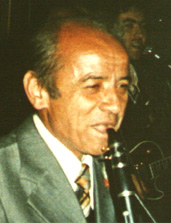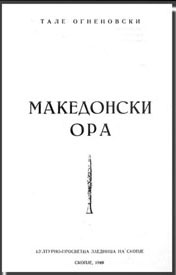 TALE
OGNENOVSKI IS UNDOUBTEDLY ONE OF THE GREATEST COMPOSERS OF MUSIC IN THE
TALE
OGNENOVSKI IS UNDOUBTEDLY ONE OF THE GREATEST COMPOSERS OF MUSIC IN THE
WORLD
1. The book "Macedonian folk dances" by Tale Ognenovski, 1989
Tale Ognenovski is the author of the book "Macedonian folk dances" ("Makedonski
ora") published by the Cultural  Educational
Association, Skopje, in 1989. The person responsible for its publication
was Mirko Stefanovski, the secretary of the Cultural Educational Association
from Skopje. The editor was Jelica Todorchevska, and it was reviewed by
Dr. Trpko Bicevski, Dimche Nikolevski and Dushko Dimitrovski. The harmony
symbols of the Macedonian folk dances (composer, Tale Ognenovski) were
written by Blagoja Deskovski. The notographer is Vasko Petkovski. Financial
support for its publication was provided by the Republic's Cultural Society,
the Republic's Scientific Society, the Autonomous Interest Society of Skopje
and 'Makedonija Tabak'.
Educational
Association, Skopje, in 1989. The person responsible for its publication
was Mirko Stefanovski, the secretary of the Cultural Educational Association
from Skopje. The editor was Jelica Todorchevska, and it was reviewed by
Dr. Trpko Bicevski, Dimche Nikolevski and Dushko Dimitrovski. The harmony
symbols of the Macedonian folk dances (composer, Tale Ognenovski) were
written by Blagoja Deskovski. The notographer is Vasko Petkovski. Financial
support for its publication was provided by the Republic's Cultural Society,
the Republic's Scientific Society, the Autonomous Interest Society of Skopje
and 'Makedonija Tabak'.
In the introduction to this book Kiril Todevski, ethnomusicologist and
editor of the Folk Music Department in Radio Skopje wrote, "Besides his
affirming Macedonian folk dances with magnetic tapes and gramophone records,
Tale Ognenovski has written this book of Macedonian folk dances, the first
such book in Macedonia. He has for a long time been associated with the
traditional expression of the Folk style and an endless desire to develop
the smallest element of folk music into a complex instrumental content...
Tale Ognenovski has performed as much music on the Radio as he has in
concert halls in our country, and in many European and non-European countries.
He began to play from the earliest age with the pipe ('kavalche') in
his village of Brusnik near Bitola, and he received recognition from the
music profession at the First Republic Festival for Macedonian folk dances
and songs in Skopje, 1948, where he won First Award for the clarinet as
the best clarinetist. It was at this time, following the Festival and his
first great award, that Ognenovski decided on a personal objective of developing
a creative traditional style in the area of instrumental music.
Year by year he developed into a real virtuoso and artist. He created
his own style of interpreting folk dances ('ora'). His particular characteristic
involved his own creative improvisations called 'maninja'.
At the same time as he was performing music like this, he started composing
his own folk dances. As a composer, he kept the traditional folk expression.
Many years of performing with the orchestras of Radio Television Skopje,
with Ensemble 'Tanec' and with other folk ensembles helped him create 'Ognenovski's
style' when producing his own Macedonian folk dances. These are easily
recognizable by their exuberant melody and rich rhythms in correlation
with the traditional style.
In this area, he is equally well recognized as a performer of 'chalgiski
ora', folk dances where the melody is always the first objective. He is
a composer of folk dances in the 'new town' tradition, which he interprets
with the Folk Music Orchestra and where the melody is created in the context
of a logical harmony. This book containing Macedonian folk dances as well
as gramophone records represents an important piece of literature for current
and future-generation instrumentalists. This book will remind us of one
uniquely talented artist, Tale Ognenovski."
In his review of the book, Dr. Trpko Bicevski, ethnomusicologist and
senior research fellow at the 'Marko Cepenkov' Institute for Folklore,
Skopje, wrote amongst other things, "...We have pleasure in recommending
for publication this book 'Macedonian folk dances' ('Makedonski ora'),
a manuscript by this former ambassador of ours in this kind of Macedonian
Music Culture all over the world."
2. "The impossible becomes possible: two,
'usually non-complimentary' parallel-existing worlds of sounds -
Europe - The Orient - are,
in Tale Ognenovski's music, naturally brought closer together, understand
each
other and merge..." - Dushko
Dimitrovski, book 'For Our Music'
Tale Ognenovski made the connection between Oriental and Western Music
"For creative generations performing our contemporary music, it is
very fortunate that we already have three (International) National Outstanding
Persons in this field of music whose brilliant creations they can surely
rely on to inspire them with authentic, dynamic power and direct them towards
creating the same. These Giants of Music are Jovan Kukuzel (John Koukouzeles)...,
Pece Atanasovski... and Tale Ognenovski...
The prodigy, however, is called Tale Ognenovski... Both Jesus Christ's:
"I came not to do away with the Bible, but to fulfil and continue it",
and Michaelangelo's: "The Artist must adopt strict, artistic rules at first,
to be able to break them afterwards"... could well apply to Ognenovski.
Absolutely masterly and limitless imagination and music inventiveness are
only 'potka', a condition, a starter, tonal 'organon', for his creative
accomplishments.... As a virtuoso playing 'Chalgija' music (in his child-hood,
as a shepherd, he played the pipe ('kavalche'); later, as an educated musician
he played Cavallini, Weber and Mozart). Tale Ognenovski, at the same time,
navigates himself effectively all around the world of classical music.
As if the ingenious knowledge of the 'chalgija' universe, but also with
the live primordial in the rustic sound, together with the vivid, creative
touch of the mysteries of European classical music idea, had predetermined
the outstanding talent of Ognenovski to make one, perhaps unconscious,
but in musical and historical terms, more than far-reaching creative step
forward. In other words if without telling in advance, we approach carefully
and analytically the 'chalgija' opus created by the Maestro, we will discover
with surprise and great delight that Ognenovski is (probably) the FIRST,
and (surely) THE FARTHEST REACHING contemporary who first made the connection
between the two "UNCONNECTABLE" worlds - the Orient and the West - with
words and melodies. Tale Ognenovski does not find it problematic to start
with a motive, a theme, and then to navigate through all the labryinths
of the archaic and old church styles, so that at in a certain section of
his improvisation... to decide on a strict, "very Western-style" tonality
and to bring all that to the starting-point by perfectly structuring and
observing the style. The impossible becomes possible: two, "usually non-complimentary"
parallel-existing worlds of sounds - Europe - The Orient - are in Tale
Ognenovski's music naturally brought closer together, understand each other
and merge.
Has Ognenovski's ingenuity in advance not done something that with the
power of empirical palpability and outright proof, will convince us that
Macedonia - with the power of both worlds of melodies being borne and present
in her galaxy of sounds - is the one predetermined to play the role of
a tonal catalyst for the future universal connection and natural mixing
and circulation of the creative idea of East - West - East? After Ognenovski,
"Anastasia" has already made an effective start down that road", wrote
Dushko Dimitrovski in his book "For Our Music" ("Za Nasha Muzika") ISBN
9989-600-01-5, published by BID "Misirkov", 1994),
3. "Musical Genius Tale Ognenovski
is on an equal level musically with other World Musical Legends" - 'Nova
Zora'
"Here began the creation of the great heritage of Macedonian Culture
which Tale Ognenovski has left. This great heritage put the musical genius
Tale Ognenovski on an equal level musically with other world musical legends.
Somebody said that Tale Ognenovski was better than Mozart...Tale Ognenovski
is the first and the longest surviving person who has managed to connect
the two 'unconnectable' Music Worlds of the Orient and the West..." This
appeared in an article entitled "The Great 'Chalgii'
opus of the Maestro Tale Ognenovski". It was published in the magazine
'Nova Zora' in Bitola, Republic of Macedonia, in November, 1994.
4. The end result of Tale Ognenovski's clarinet works is an
expression of his own amazing virtuosity
Like his other clarinet works, the end result of Tale Ognenovski's Clarinet
Concerto No.1 is an expression of his own amazing virtuosity. Every register
of the clarinet finds eloquent expression in this concert.
With this classical concert this creative musical genius continues
to extend the river of great beauty that is classical music. He possesses
complete perfection and wisdom.
Tale Ognenovski's Clarinet classical composition is far more than a
demonstration of the clarinet's tonal qualities, as well as what is technically
possible with a clarinet - these he had already explored and favoured in
his compositions of Macedonian folk dances. It is also a display of imaginative
power, a colourful, almost romantic emotion, and sensitive feeling. This
concert includes some very creative and technically demanding solos, and
the clarinet soloist needs extremes in his range, tonal control, technique
and dynamism.
Tale Ognenovski composed numerous musical works from different genres:
folk dances, classical and jazz music, which established the clarinet as
an instrument capable of the highest range of expression in solo music.
His music demands a virtuoso of the clarinet, and exploits among other
things the deeper sounds of different sounding registers of the instrument
very effectively.
Tale Ognenovski is one of the greatest exponents of writers of clarinet
music. He spent the years 1947 to 1952 studying classical music independently,
and become a virtuoso clarinet soloist. He performed works by Mozart, Cavallini,
Wagner, Weber and more.
With his 'Jazz composition No. 1', Tale Ognenovski introduced a new
form of jazz - 'Tale Ognenovski Jazz'. He recorded this jazz composition
on June 16, 1998 for the televised programme 'Good Morning Macedonia'.
He demonstrates remarkable technique together with a quite unique sound
and the ability to come up with wonderfully harmonious phrases. In his
compositions, every note makes sense. He is a master of improvisations,
of creating new melodies that have an impact on many parts of the structure
of his compositions of Macedonian folk dances.
Tale Ognenovski is the finest exponent of clarinet playing. His performances
are perfect and the sound he produces is a revelation in just how beautifully
the clarinet can be played; from the lowest bass notes to pitches in his
upper range, he maintains their timbre and purity. No one else can compare
with his playing Macedonian folk dances, jazz and classical music on the
clarinet. His delicate tonal precision, his ringing warmth, his musical
and instrumental intonation and his technically demanding solos are a delight
to listen to.
 Back
to the Tale Ognenovski Biography Page
Back
to the Tale Ognenovski Biography Page
 Educational
Association, Skopje, in 1989. The person responsible for its publication
was Mirko Stefanovski, the secretary of the Cultural Educational Association
from Skopje. The editor was Jelica Todorchevska, and it was reviewed by
Dr. Trpko Bicevski, Dimche Nikolevski and Dushko Dimitrovski. The harmony
symbols of the Macedonian folk dances (composer, Tale Ognenovski) were
written by Blagoja Deskovski. The notographer is Vasko Petkovski. Financial
support for its publication was provided by the Republic's Cultural Society,
the Republic's Scientific Society, the Autonomous Interest Society of Skopje
and 'Makedonija Tabak'.
Educational
Association, Skopje, in 1989. The person responsible for its publication
was Mirko Stefanovski, the secretary of the Cultural Educational Association
from Skopje. The editor was Jelica Todorchevska, and it was reviewed by
Dr. Trpko Bicevski, Dimche Nikolevski and Dushko Dimitrovski. The harmony
symbols of the Macedonian folk dances (composer, Tale Ognenovski) were
written by Blagoja Deskovski. The notographer is Vasko Petkovski. Financial
support for its publication was provided by the Republic's Cultural Society,
the Republic's Scientific Society, the Autonomous Interest Society of Skopje
and 'Makedonija Tabak'.
 TALE
OGNENOVSKI IS UNDOUBTEDLY ONE OF THE GREATEST COMPOSERS OF MUSIC IN THE
TALE
OGNENOVSKI IS UNDOUBTEDLY ONE OF THE GREATEST COMPOSERS OF MUSIC IN THE